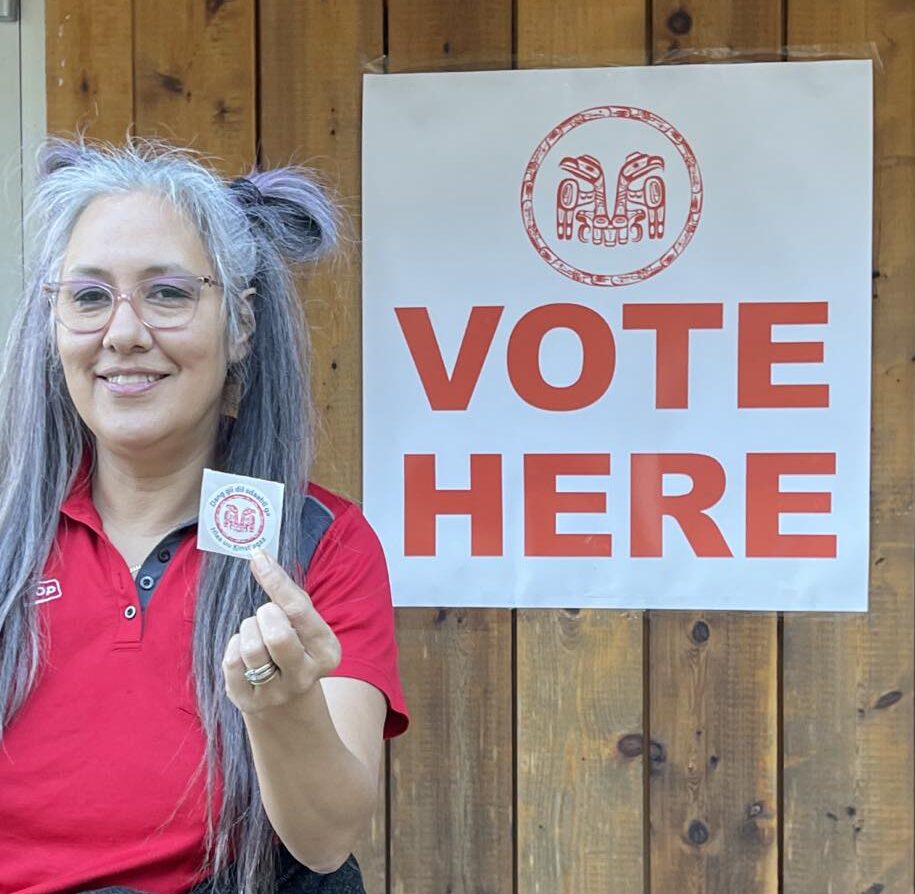Jason Alsop has been re-elected as President of the Council of the Haida Nation (CHN) for a third consecutive term, continuing his leadership during a pivotal time for Haida Gwaii. His successful campaign, bolstered by a viral social media effort, highlights his commitment to the community and the critical work of the CHN in protecting Haida lands and waters.
The Vice Presidency saw a decisive victory for Stephen (Buck) Grosse, who claimed 73.6% of the votes. Lisa Diane Hageman, Ross John Parnell, Tarah Samuels, Erika Stocker were all elected in the Gaw region.
In the HiGaagilda region Laura (Goox) Beaton, Desi Collinson, Shawn Cowpar and Randy Pryce were elected by acclamation. The T’agwan region saw notable competition, with Deborah Bell and Tasha Samuels emerging victorious.
Leadership and innovation have long been hallmarks of Haida Gwaii, but back in 1974, the future of the islands looked quite different. Entire forests were being decimated, waters clogged with loaded marine vessels, and decisions were made without Haida consultation. To make matters worse, much of the profit from these endeavors did not stay on the island.
In response, Haida leaders decided something had to change. They formed their own governing structure outside the band councils to reclaim decision-making power over the island’s lands. The band councils had jurisdiction only over their reservations, not the island as a whole (though the Chief Councillor of each band council contributes to CHN decisions). This led to the formation of the Council of the Haida Nation, with Godfrey Kelly elected president and Percy Williams, Ernie Collison, and Frank Collison serving as vice presidents. Reg Kelly became the Executive Consultant, and Percy Gladstone the Executive Officer.
The CHN’s first major challenge came in 1985 when Haida and non-Haida citizens alike gathered on Lyell Island to block loggers from accessing their cut blocks and halt further deforestation. This high-profile action led to a rare victory over corporate interests, resulting in the establishment of Gwaii Haanas National Park, covering the southern third of Haida Gwaii, formerly known as South Moresby.
Since then, the Haida Nation has flourished and become a model for other First Nations, providing them with a template to establish their own governing bodies to protect their lands, rights, and futures.
Now, in the present day, Gaagwiis (Jason Alsop) continues this legacy, re-elected as CHN president for a third term. His campaign success was partly fueled by a viral social media campaign where he posted regular updates, used current trends, and created virtual walk-through videos to guide voters to polling locations.
“To everyone who put their name forward and ran in the election, I appreciate your willingness to serve and lead our nation,” Gaagwiis said in a post after his landslide victory. “Your courage and commitment to create positive change and advance the work set out for us by previous generations is truly admirable.”
Like other governments, CHN conducts a formal voting process in private polling booths, with leaders serving three-year terms. This system has worked well in the past, though occasional errors do occur. The election was postponed after a mishap caused several votes to be compromised on December 7, prompting the Head Electoral Officer, Grace Garvie, to call for a re-vote for the sake of transparency and fairness.
The rescheduled election on December 16 went smoothly.
With the election results behind him, Gaagwiis can now focus on critical CHN matters, such as the landmark Haida Land Title Agreement. First initiated in 2002, the agreement has gained momentum recently, with British Columbia recognizing Haida aboriginal title to the lands of Haida Gwaii. “With recognition and affirmation of Haida Title, we are emerging from a dark period into a new light,” Gaagwiis said at the Haida Title celebration feast in July. “Together, we will shape this future.”
